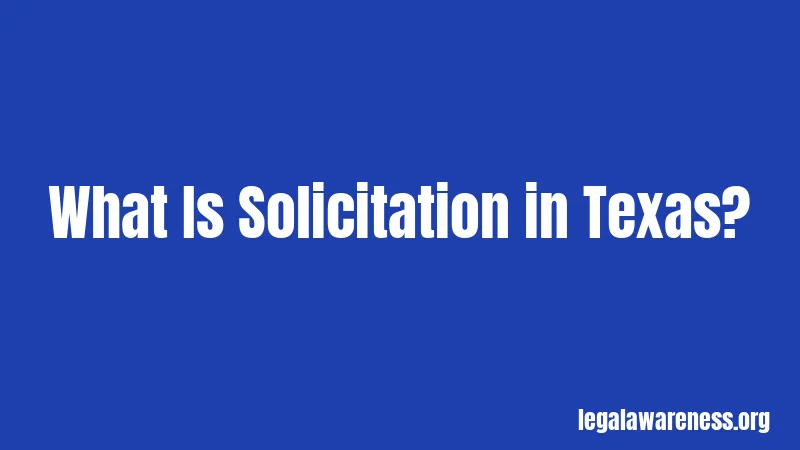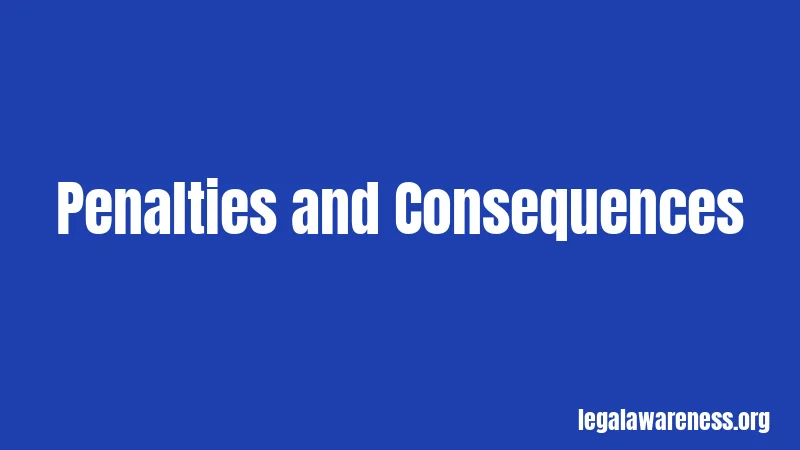Texas Solicitation Laws (2026): What Really Gets You in Trouble
Most people have no idea how serious Texas takes solicitation laws. You probably think it’s just about asking someone for money on the street, right? Wrong. Honestly, it’s way more complicated than that, and the penalties can be surprisingly harsh.
Let’s be real here. People get arrested for solicitation in Texas all the time. They don’t even realize they broke the law until it’s too late. The good news? Understanding these laws takes just a few minutes. After you read this, you’ll know exactly what’s illegal and what isn’t.
What Is Solicitation in Texas?

Okay, pause. This part is important because it sets up everything else. Solicitation means asking someone for something with specific intent. Usually, it’s asking for money, sex, or help with a crime. The key word here? Intent. You have to be deliberately trying to get something.
Think of it like this. If a friend asks you for a ride, that’s just a normal conversation. But if you’re standing outside a store asking strangers for money to buy gas, that’s solicitation. The difference is the context and what you’re actually doing.
Texas law breaks this down into specific categories. Each one has different rules and different penalties. Some types of solicitation are totally legal. Others will land you in serious trouble. Let’s dig into what actually gets you arrested.
Basic Solicitation Laws in Texas
Begging and Panhandling
Here’s the thing about Texas solicitation laws. Many cities have their own rules, but the state laws are pretty clear. In Texas, you cannot solicit money, goods, or services from another person in any public place. You’re probably thinking, “Wait, don’t homeless people do this all the time?” Great question.
The answer is yes, they do. And technically, many of them are breaking the law. Texas doesn’t have a blanket statewide ban on panhandling, but individual cities do. Dallas, Houston, Austin, and San Antonio all have their own ordinances that restrict where and how you can ask for money.
If you’re caught panhandling in a location where it’s prohibited, you could face a Class C misdemeanor. That means a fine up to $500. It doesn’t sound bad, but here’s where it gets worse. If you have prior convictions, or if you’re caught multiple times, the penalties stack up fast.
The tricky part? Some cities are stricter than others. Austin allows panhandling in many areas but prohibits it near ATMs and on public transit. Houston bans it in certain downtown zones. You need to check your specific city’s rules because they vary.
Solicitation of Sex
Now, here’s where Texas really cracks down. Solicitation of prostitution is a serious crime in the state. This isn’t a gray area. It’s black and white illegal.
Texas Penal Code Section 21.08 makes it a crime to offer, agree to, or engage in sexual conduct for a fee. You’re gonna love this one: it applies to the person offering sex AND the person paying for it. So if you’re soliciting someone for sex work, you’re breaking the law, period.
A first offense for soliciting prostitution is a Class B misdemeanor. That’s up to 180 days in jail and a fine up to $2,000. Not sure what counts as solicitation? Basically anything where you’re trying to arrange sexual conduct in exchange for money or anything of value counts. That includes arranging it online.
Here’s where it gets really serious. If you’re caught a second time within ten years, it becomes a Class A misdemeanor. Your jail time jumps to up to one year, and fines go up to $4,000. Multiple convictions can follow you for life. Plus, you’ll likely have to register as a sex offender in Texas.
Solicitation to Commit a Crime
Sound complicated? It’s actually not. This one’s straightforward. Texas law says you can’t ask someone to help you commit a crime. It doesn’t matter if they agree or not. Just asking is illegal.
So if you’re trying to recruit someone to help you steal something, sell drugs, or hurt someone, you’re committing the crime of solicitation. This is serious business. You can be prosecuted for solicitation even if the underlying crime never happens.
The penalties depend on the crime you’re soliciting. If you’re asking someone to commit a felony, you face felony charges. If it’s a misdemeanor, you face misdemeanor charges. But here’s the important part: you can be punished almost as severely as if the crime had actually occurred.
Wait, it gets better. Stay with me here. You can be charged with both solicitation AND conspiracy. That means double charges, double penalties, and double trouble in court. Prosecutors love stacking charges like this because it gives them more leverage.
Solicitation Near Schools and Public Places

Hold on, this part is important. Texas has extra protection laws for minors. If you solicit near schools, playgrounds, or youth centers, the penalties get more serious. Much more serious.
Let’s say you’re panhandling near an elementary school. That’s no longer just a Class C misdemeanor. Depending on the location and city ordinance, you could face enhanced penalties. Some cities charge this as a Class B misdemeanor, which means jail time and bigger fines.
But here’s the really serious stuff. If you’re soliciting a minor for illegal activity, sexual contact, or anything else illegal, you’re looking at felony charges. We’re talking about years in prison, not just months. And you’ll be on a sex offender registry if it involves sexual solicitation.
This applies online too, honestly. You don’t have to be physically near a school for the enhanced penalties to apply. If you solicit a minor online, especially for sex or illegal activity, Texas prosecutors will pursue serious charges. The minimum punishment is a felony conviction.
Solicitation Online and Social Media
Okay, here’s where most people get confused. Your online activity counts. Completely. Everything you do on the internet can be evidence of solicitation in Texas.
If you send messages asking someone for sex, money, or help with a crime, that’s solicitation. It doesn’t matter if you met them on Facebook, Instagram, dating apps, or anywhere else. Digital communication is treated exactly the same as face-to-face solicitation.
Texas law enforcement actively monitors online solicitation. They set up undercover accounts. They pose as minors or sex workers. They build cases against people who solicit online. And the charges are just as serious as if you’d done it in person.
Here’s what you need to know. Soliciting online can result in federal charges too, especially if it involves minors across state lines. That means you could be facing both state and federal prosecution. The penalties double. Your prison time increases. You’re looking at serious consequences.
Penalties and Consequences

Let’s talk about what actually happens when you break these laws. The penalties in Texas are harsh, and they get harsher with each offense.
For basic panhandling or begging in prohibited areas, you’re looking at a Class C misdemeanor. That’s up to $500 in fines. No jail time for a first offense usually, but it goes on your record. A second offense within ten years becomes a Class B misdemeanor, which means up to 180 days in jail and fines up to $2,000.
Solicitation of prostitution is way more serious. First offense: Class B misdemeanor, 180 days in jail, up to $2,000 fine. You’ll likely have to register as a sex offender. A second offense becomes a Class A misdemeanor. You’re looking at up to one year in jail and $4,000 in fines.
Solicitation to commit a crime puts you in felony territory quickly. If the crime you’re soliciting is a felony, you’re facing felony charges. Depending on the specific felony, you could face anywhere from two to ten years in prison. Plus fines that can reach $10,000 or more.
The real kicker? Convictions follow you forever. Employers see them. Landlords see them. Banks and credit companies see them. You could lose job opportunities, housing, and financial options because of a solicitation conviction. That’s the hidden penalty nobody talks about.
Special Circumstances and Exceptions
Alright, not everything counts as illegal solicitation. There are actual exceptions, and understanding them matters.
First, legitimate charitable fundraising is legal. If you work for a registered nonprofit and you’re raising money for that organization, that’s not solicitation. It’s a protected activity. But you need to follow the rules. You need proper documentation. You need to be honest about where the money goes.
Second, religious and political solicitation is largely protected. You can ask people to donate to your church or political campaign. Again, you need to follow the rules. You need to be truthful. You can’t misrepresent where the money goes or who you represent.
Third, commercial transactions don’t count as illegal solicitation. If you’re a business asking customers to buy your products or services, that’s just sales. That’s completely legal. The difference is you have a legitimate business and you’re offering an actual product or service.
But here’s where people mess up. If you’re soliciting for something that’s actually illegal or deceptive, it doesn’t matter if you claim it’s legitimate. Prosecutors will investigate. They’ll find the truth. And the charges will be serious.
How to Stay Safe and Compliant in Texas
Okay, this one’s important. Here’s what you actually need to do to avoid breaking these laws.
First, know the specific rules in your city. Solicitation laws vary by municipality in Texas. What’s illegal in Dallas might be legal in a different Texas city. Spend fifteen minutes on your city’s website. Look up the local ordinances. Know the rules where you live and work.
Second, if you’re panhandling or fundraising, know where you can and can’t do it. Most Texas cities prohibit solicitation near ATMs, storefronts, and bus stops. Stay away from these areas. Stick to public parks or areas where it’s explicitly allowed.
Third, never solicit anyone for illegal activity. This one’s obvious, but people do it anyway. Just don’t. The consequences are severe and lifelong.
Fourth, if you’re running a nonprofit or charity, get proper registration and documentation. Make sure you’re following state and federal fundraising laws. Keep records of where donations go. Be transparent with donors. This protects you legally.
Fifth, understand consent. If you’re in any situation involving another person, make sure there’s genuine agreement. Especially with anything involving money or services. Misunderstanding someone’s willingness is not a defense in Texas.
And honestly, when in doubt, don’t do it. It’s better to miss an opportunity than to risk a conviction. Solicitation charges can seriously damage your life. Your criminal record, your reputation, your future. It’s just not worth it.
Frequently Asked Questions
Is panhandling legal anywhere in Texas? Some areas allow it with restrictions. Austin and San Antonio have designated zones where panhandling is permitted. Check with your specific city for details. Most major cities restrict it in downtown areas and near certain businesses.
Can I be charged with solicitation if the other person agreed? Yes, absolutely. Whether the other person agrees or not doesn’t matter. Offering or agreeing to solicitation is the crime, not the completion of whatever you’re soliciting for. Consent doesn’t make it legal.
What’s the difference between solicitation and prostitution charges? You can be charged with both. Solicitation is asking for or agreeing to pay for sexual conduct. Prostitution is actually engaging in sexual conduct for payment. Both are crimes in Texas with serious penalties.
Does texting someone count as solicitation? Yes, completely. Digital communication is treated exactly the same as face-to-face solicitation in Texas. Text messages, emails, social media messages, everything counts as evidence of solicitation.
Can I be convicted of solicitation if the crime never happens? Yes, you can. Solicitation is a crime in itself. You don’t need to actually commit the crime you’re soliciting for. Just asking or attempting to recruit someone is enough to be convicted and punished.
Final Thoughts
Now you know the basics about Texas solicitation laws. They’re strict, they’re enforced, and they come with serious consequences. The best strategy is simple: understand the laws in your area and avoid breaking them.
If you’re running a legitimate business or nonprofit, follow the proper procedures. Get registered. Get documented. Keep records. That protects you legally. If you’re ever unsure about whether something is legal, look it up or ask a lawyer. Seriously. It’s worth the peace of mind.
Stay informed, stay legal, and remember that one solicitation charge can follow you for decades. When in doubt, don’t do it.
References
Texas Penal Code Chapter 21 – Sexual Offenses
Texas Penal Code Section 15.03 – Solicitation
City of Austin Panhandling Ordinance
City of Houston Regulations on Solicitation
Texas Attorney General – Consumer Fraud and Charitable Solicitation
